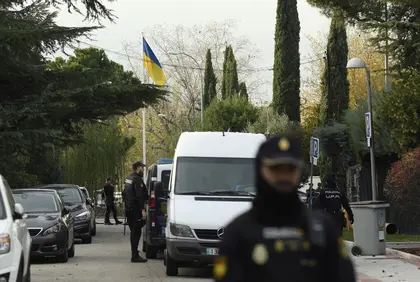Spanish police arrested a suspect Wednesday, Jan. 25, in the letter bombing campaign that targeted the prime minister and the Ukrainian embassy, authorities said.
The Spanish citizen was taken into custody in Miranda de Ebro in northern Spain and police were searching the home of the man, who a police source said was 74 years old.
JOIN US ON TELEGRAM
Follow our coverage of the war on the @Kyivpost_official.
Nobody was killed by the six letter bombs sent in late November and early December to various sites in Spain, but an employee of the Ukrainian embassy was lightly injured while opening one of the packages.
Among the sites targeted was the official residence of Prime Minister Pedro Sanchez, Spain's defense ministry and an air base near Madrid from which weapons donated by Spain are sent to Ukraine.
The headquarters of a military equipment firm in the northeastern city of Zaragoza which makes the grenade launchers that Spain has sent to Ukraine was also targeted.
Kyiv ramped up security at its embassies abroad after the embassy in Madrid was targeted by a letter bomb.
The arrest comes after the New York Times reported Sunday that Russian military intelligence officers had "directed" associates of a white supremacist militant group based in Russia to carry out the campaign in Spain.
US officials told the newspaper that the Russian officers who directed the campaign appeared intent on "keeping European governments off guard" and "may be testing out proxy groups in the event Moscow decides to escalate a conflict".

When the West’s Stupidity Prevents Ukraine’s Victory
Investigators suspect the Russian Imperial Movement (RIM), a radical group that has members and associates across Europe, of being behind the letter bomb campaign.
The group, which is designated a global terrorist organization by the United States, is believed to have ties to Russian intelligence agencies.
"Important members of the group have been in Spain, and the police there have tracked its ties with far-right Spanish organizations," the newspaper said.
The newspaper based its report on anonymous "US and allied officials".
- 'Terrorist methods' -
According to Stanford University's Center for International Security and Cooperation, RIM "maintains contacts with neo-Nazi and white supremacist groups across Europe".
"The group has provided paramilitary training to Russian nationals and members of like-minded organizations from other countries at its facilities in St. Petersburg," it added.
Ukraine's ambassador to Spain, Serhii Pohoreltsev, had appeared to blame Russia for the letter bomb at its embassy.
"We are well aware of the terrorist methods of the aggressor country," he said during an interview with Spanish public television on November 30 just hours after the letter exploded.
Russia's embassy to Spain condemned the letter bomb campaign.
"Any threat or terrorist act, especially those that target a diplomatic mission, is to be totally condemned," it said in a tweet at the time.
Spain's National Court had opened an investigation for "terrorism" over the letter bombing campaign.
In addition to sending arms to help Ukraine after Russia sent troops into the country in February last year, Spain is also training Ukrainian troops as part of a European Union program and providing humanitarian aid.
You can also highlight the text and press Ctrl + Enter






